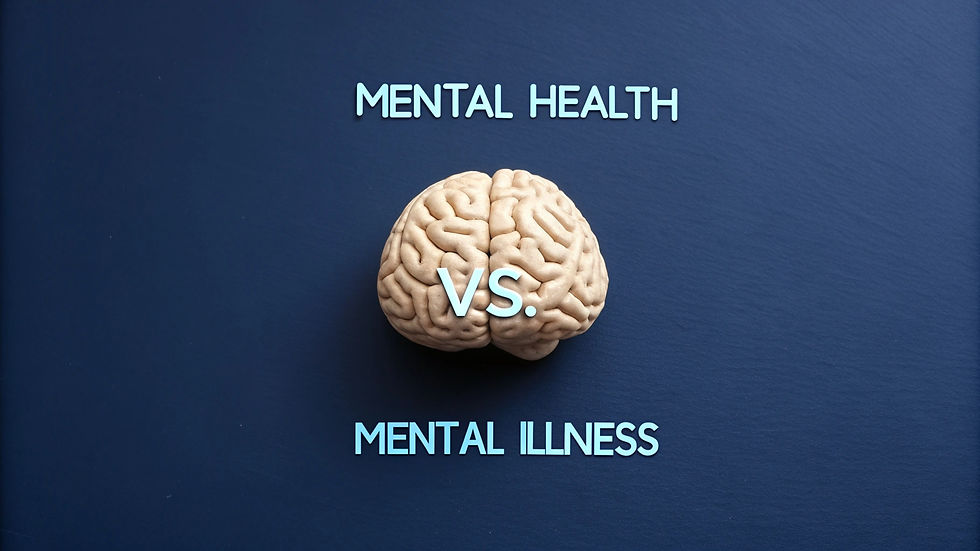Panic Attacks Explained: What They Are and How to Stop Them
- Seo Services
- Apr 17, 2025
- 3 min read
Updated: May 26, 2025

In today's fast-paced world, more Americans than ever are struggling with anxiety and panic attacks. Whether it hits you in the middle of the night or the middle of a work meeting, a panic attack can feel terrifying — like your body is going into overdrive, and you're completely out of control. But the good news is you're not alone; there are ways to manage and overcome these episodes.
Let's break down what panic attacks are, why they happen, and how to stop them before they take over your life.
What Is a Panic Attack?
A panic attack is a sudden episode of intense fear or discomfort that triggers severe physical reactions when there is no real danger or apparent cause. These episodes often strike without warning and can last anywhere from a few minutes to over half an hour.
Common Symptoms Include:
Rapid heartbeat or palpitations
Sweating or chills
Shortness of breath or hyperventilation
Trembling or shaking
Feeling dizzy, faint, or lightheaded
Nausea or abdominal distress
Feeling detached from reality (depersonalization or derealization)
Fear of losing control or going crazy
Fear of dying
For many, a panic attack feels like a heart attack. Your body's "fight-or-flight" system goes haywire, even when no real threat exists.
What Causes Panic Attacks?
While the exact cause can vary, some of the most common triggers in the U.S. include:
Chronic stress
Genetics and family history of anxiety
Significant life changes or trauma
Substance abuse or withdrawal
Underlying mental health conditions like generalized anxiety disorder or PTSD
In some cases, panic attacks can develop into Panic Disorder, where a person becomes consumed with the fear of having another attack — often avoiding places or situations where an episode might occur.
How to Stop a Panic Attack: 6 Proven Strategies
If you or someone you know experiences panic attacks, here are evidence-based techniques that can help stop them in their tracks:
1. Practice Deep Breathing
Panic attacks often involve hyperventilation. Slow, deep breaths through your nose and out your mouth can calm your nervous system.
2. Ground Yourself
Use the 5-4-3-2-1 technique: Name five things you see, four you can touch, three you hear, two you smell, and one you taste. This will bring your attention back to the present.
3. Challenge Negative Thoughts
Recognize that this is a panic attack — not a heart attack. Remind yourself that it will pass.
4. Use Cold Water
Splashing cold water on your face or holding an ice cube can help "reset" your brain and reduce symptoms quickly.
5. Get Moving
A short AA walk can release endorphins and regulate your stress response if possible.
6. Talk to a Professional
Panic attacks are treatable. You can learn to reduce their frequency and impact with therapy and holistic approaches.
Long-Term Solutions: You Don't Have to Suffer in Silence
Brain Health Solution aims to help individuals like you regain control, reduce anxiety, and live more peaceful, empowered lives. Through a personalized, holistic approach — including talk therapy, nutritional support, and mind-body techniques — we address both the symptoms and the root causes of your panic attacks.
You're not broken — your brain just needs support. And we're here to help.
✅ Ready to take the first step toward healing?
Frequently Asked Questions (FAQs)
1. Are panic attacks dangerous?
No, panic attacks are not life-threatening, although they can feel incredibly intense. With the proper treatment, they can be effectively managed.
2. Can panic attacks be cured permanently?
While there's no guaranteed "cure," many people experience long-term relief with therapy, lifestyle changes, and holistic care.
3. Should I go to the ER during a panic attack?
If you're unsure whether it's a panic attack or a medical emergency, it's best to seek immediate medical attention to rule out other conditions.
4. Can diet or lifestyle affect panic attacks?
Absolutely. Poor sleep, caffeine, alcohol, and chronic stress can all trigger or worsen panic attacks.
5. What's the best therapy for panic attacks?
Cognitive Behavioral Therapy (CBT) is highly effective. At Brain Health Solution, we also combine CBT with mindfulness, nutrition, and personalized care plans.
.png)



Comments